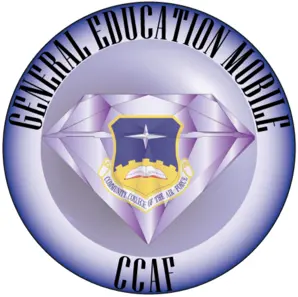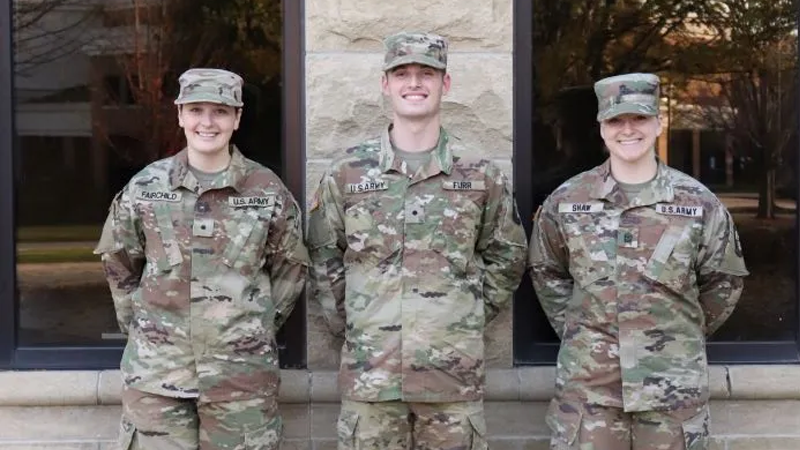IWU is honored to be one of the few colleges or universities accepted to participate in the Community College of the Air Force (CCAF) General Education Mobile (GEM) program.
As a signatory of the Department of Defense Memorandum of Understanding for Post-Secondary Educational Institutions (DoD MOU) IWU complies with all requirements of Executive Order 13607 and the Principles of Excellence for Educational Institutions Serving Service Members, Spouses and Other Family Members.
The GEM partnership empowers CCAF students to complete their General Education requirements as a single block, from the same institution allowing for faster completion of their Associate Degree.
IWU is proud to offer:

Indiana Wesleyan offers a wide range of general education courses approved by the CCAF.
Develops world changing communicators who are effective and ethical creators and consumers of public address both theoretically and practically.
Provides students with an understanding of communication encountered in various social settings, with an emphasis on both theoretical and practical aspects. Students will gain an understanding of communication as it affects the individual in message construction, interpersonal interaction, group and organizational settings, public settings, cultural settings, and mediated communication settings. Students will examine the ethics of communication and prepare and deliver presentations.
An introduction to Spanish language and Hispanic cultures with emphasis on reading, writing, listening, and speaking designed for true beginners. Class lectures and discussions are conducted in Spanish in order to build communicative competence. Prerequisite: IWU-Marion students - Permission of Division Chair of Modern Language and Literature. Students may not self-place in a language course.
This course helps students develop an ability to express their ideas effectively in writing. Students will learn to use the writing process of pre-writing, drafting, revising, editing, and reflecting to create personal and expository essays. This will include evaluation and synthesis of sources and ideas. Students will also learn to give and receive criteria-based feedback within a small writing community of peers.
In this course, students will further develop effective written communication and research writing skills. Students will write a persuasive research paper using the writing process of pre-writing, drafting, revising, editing, and reflecting. By evaluating and synthesizing a variety of sources, students will sharpen their ability to communicate and think critically in an academic setting. Prerequisite: ENG-140 or equivalent
An introduction to Spanish language and Hispanic cultures with emphasis on reading, writing, listening, and speaking designed for true beginners. Class lectures and discussions are conducted in Spanish in order to build communicative competence. Prerequisite: IWU-Marion students - Permission of Division Chair of Modern Language and Literature. Students may not self-place in a language course.
In this course, students will describe the use of economics in business from a biblical perspective. They will have the opportunity to explain the interaction of supply and demand as well as demand-elasticity. Throughout the course, students will be challenged to identify the causes and effects of externalities, explain a firm's cost of production, and classify markets according to their structure and level of competition. Core ideas that make up the economic way of thinking will be explained from a global perspective.
This course is a survey of primary individuals, events, and themes of American history from the end of the Civil War up to the present era. Political, social, economic, religious, and military topics will be covered in eras such as the following: Reconstruction, Gilded Age and industrialism, Wilsonian Progressivism, World War I, Great Depression, World War II, Cold War, Vietnam, Civil Rights movement, American cultural diversity, and global terrorism. Not open to students with credit in HST-212.
A study of American federal government in all its important phases with an introduction to the major fields of political science, including political thought, domestic politics, political economy, and international politics. This course as offered on the IWU Marion campus meets IDoE Government and Citizenship Standards' requirements and required standards from the National Council for the Social Studies.
Examines patterned relations between groups and populations in a variety of contexts, especially those characterized by differences in power and privilege. Meets intercultural requirement for IWU-Marion students.
This course provides a general introduction to the major concepts and themes of political science. As a comparative survey of the questions, approaches and methods in political science the course offers an analytical foundation for evaluating and explaining a wide variety of political phenomena. Throughout the semester several of the subfields comprising political science including American politics, comparative politics, world politics, law and public policy are introduced and highlighted to prepare students for upper-division coursework in these specific areas of study. All through the course consideration is given to determining how a Christian worldview can be applied to the complex realities of governing in modern societies. Prerequisite: POL-100 or admission into the CAPS BSIR program.
This course surveys the most important concepts, approaches and methods in the comparative study of politics. Students are introduced to comparative politics as a method of research and a field of study examining the domestic politics of governments throughout the world. Course material discusses and applies the conceptual, theoretical and methodological tools of comparative political analysis, examines the characteristics and effects of various types of contemporary political systems, and surveys the politics of and recent trends in select countries and regions throughout the world. This course meets IDoE Government and Citizenship Standards' requirements and required standards from the National Council for the Social Studies.
This course uses sociological concepts and perspectives to study the social construction of social problems, and how they are perceived addressed.
This course is a detailed study of the Civil War. Students will explore antebellum American culture, the sectional crisis between the North and the South, and the role of Christianity in this era. Students will also learn about the important battles and military campaigns of the war, the nature of mid-19th century American warfare, social and political developments during the war, and the important personalities of the conflict.
The purpose of this course is to introduce the study of world politics. By surveying the key concepts and theories utilized to assess contemporary global affairs this course provides a framework for analyzing world politics in a systematic and sophisticated manner. Course topics will provide a brief overview of the major areas of study within the field of international relations including foreign policy analysis, global politics and governance, international political economy and the continuing evolution of the international system. This course as offered on the IWU Marion campus meets IDoE Government and Citizenship Standards' requirements and required standards from the National Council for the Social Studies.
An introduction to cultural anthropology which seeks to expose students to different cultures of the world as well as help them to appreciate cultural diversity. An excellent orientation course for those who will be working in cross-cultural contexts.
An introductory course for non-math majors, this course uses applications from the world today to combine critical thinking with mathematical skills. Quantitative problem solving techniques and decision-making methods are applied toward both personal and professional experiences in everyday living.
An introduction to elementary concepts in descriptive and inferential statistics using applications from various disciplines. Students will gain experience with usage of statistical software. Topics include data collection and summarization, random variables and probability distributions, linear correlation and regression, confidence intervals, and hypothesis testing. This course will meet General Education requirements. Prerequisite: Satisfaction of the mathematics preparatory requirement.
The focus of this course is the development of quantitative reasoning skills and critical thinking skills. Students will have opportunities to apply mathematical, proportional, geometric, and statistical reasoning to various real world situations. Topics include algebraic expressions, linear equations and inequalities, proportions, probability, and descriptive statistics.
This course is an integrated study of the history and appreciation of art and music in Western culture from the Middle Ages to the present era. Students will learn to discuss the aesthetic, historical, and elemental similarities of both disciplines. Students will explore lifelong arts enjoyment, skills in critical interpretation, becoming an informed consumer, and aesthetically appreciating the many genres of musical and visual art, including traditional and popular styles. Previous experience in music and art appreciation is not required.
A study of the fundamental ethical problems of the individual and society and a survey of the various fields of practical ethics. Prerequisite: PHL-180 or permission of department.
As an Air Force and Space Force GEM student at IWU you have an exciting opportunity available to you once you’ve completed your CCAF degree.
If a master’s degree is something you’ve thought about, consider IWU’s Associate to Master’s programs that help you save time and valuable tuition assistance.


Unofficial Transcript Review
See how your prior experience can help you finish your degree. Submit your JST/CCAF transcripts below and receive a free unofficial review within 72 hours.